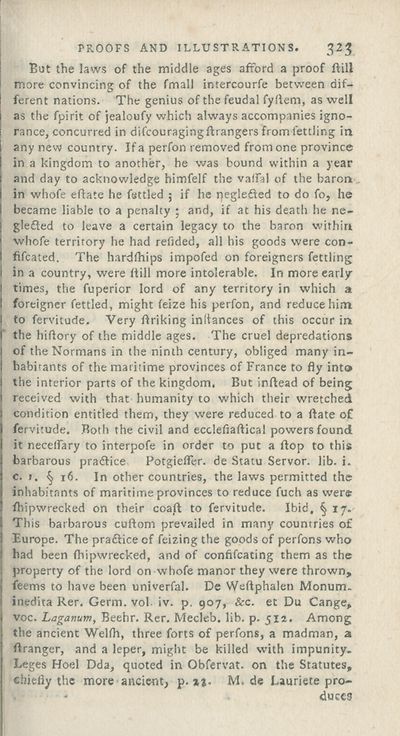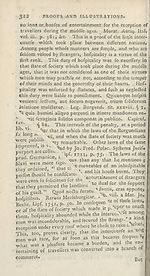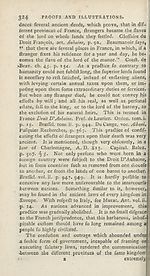Download files
Complete book:
Individual page:
Thumbnail gallery: Grid view | List view

PROOFS AND ILLUSTRATIONS. 32$
But the laws of the middle ages afford a proof Bill
more convincing of the fmall intercourfe between dif¬
ferent nations. The genius of the feudal fyllem, as well
as the fpirit of jealoufy which always accompanies igno¬
rance, concurred in difcouragingftrangers from fettling in
any new country. If a perfon removed from one province
in a kingdom to another, he was bound within a year
and day to acknowledge himfelf the vaifal of the baron
in whofe eftate he fettled ; if he pegleited to do fo, he
became liable to a penalty : and, if at his death he ne-
glefled to leave a certain legacy to the baron within
whofe territory he had refided, all his goods were con-
fifcated. The hardfhips impofed on foreigners fettling
in a country, were ftill more intolerable. In more early
times, the fuperior lord of any territory in which a
foreigner fettled, might feize his perfon, and reduce him
to fervitude. Very flriking inltances of this occur in
the hiflory of the middle ages. The cruel depredations
of the Normans in the ninth century, obliged many in¬
habitants of the maritime provinces of France to fly into
the interior parts of the kingdom. But inftead of being
received with that humanity to which their wretched
condition entitled them, they were reduced to a (late of
fervitude. Both the civil and ecclefiaftical powers found
it necelfary to interpofe in order to put a (lop to this
barbarous pradtice Potgiefler. de Statu Server, lib. i.
c. 1. ^ 16. In other countries, the laws permitted the
inhabitants of maritime provinces to reduce fuch as were
fhipwrecked on their coaft to fervitude. Ibid, § 17.
This barbarous cuftom prevailed in many countries of
Europe. The praftice of feizing the goods of perfons who
had been (hipwrecked, and of confifcating them as the
property of the lord on whofe manor they were thrown,
feems to have been univerfal. De Weftphalen Monum-
inedita Rer. Germ. vol. iv. p. 907, &c. et Du Cange,
voc. Laganum, Beehr. Rer. Mecleb. lib. p. 512. Among
the ancient Welfli, three forts of perfons, a madman, a
flranger, and a leper, might be killed with impunity.
Leges Hoel Dda, quoted in Obfervat. on the Statutes,
chiefly the more ancient, p. «. M, de Lauriete pro-
V • « . duces
But the laws of the middle ages afford a proof Bill
more convincing of the fmall intercourfe between dif¬
ferent nations. The genius of the feudal fyllem, as well
as the fpirit of jealoufy which always accompanies igno¬
rance, concurred in difcouragingftrangers from fettling in
any new country. If a perfon removed from one province
in a kingdom to another, he was bound within a year
and day to acknowledge himfelf the vaifal of the baron
in whofe eftate he fettled ; if he pegleited to do fo, he
became liable to a penalty : and, if at his death he ne-
glefled to leave a certain legacy to the baron within
whofe territory he had refided, all his goods were con-
fifcated. The hardfhips impofed on foreigners fettling
in a country, were ftill more intolerable. In more early
times, the fuperior lord of any territory in which a
foreigner fettled, might feize his perfon, and reduce him
to fervitude. Very flriking inltances of this occur in
the hiflory of the middle ages. The cruel depredations
of the Normans in the ninth century, obliged many in¬
habitants of the maritime provinces of France to fly into
the interior parts of the kingdom. But inftead of being
received with that humanity to which their wretched
condition entitled them, they were reduced to a (late of
fervitude. Both the civil and ecclefiaftical powers found
it necelfary to interpofe in order to put a (lop to this
barbarous pradtice Potgiefler. de Statu Server, lib. i.
c. 1. ^ 16. In other countries, the laws permitted the
inhabitants of maritime provinces to reduce fuch as were
fhipwrecked on their coaft to fervitude. Ibid, § 17.
This barbarous cuftom prevailed in many countries of
Europe. The praftice of feizing the goods of perfons who
had been (hipwrecked, and of confifcating them as the
property of the lord on whofe manor they were thrown,
feems to have been univerfal. De Weftphalen Monum-
inedita Rer. Germ. vol. iv. p. 907, &c. et Du Cange,
voc. Laganum, Beehr. Rer. Mecleb. lib. p. 512. Among
the ancient Welfli, three forts of perfons, a madman, a
flranger, and a leper, might be killed with impunity.
Leges Hoel Dda, quoted in Obfervat. on the Statutes,
chiefly the more ancient, p. «. M, de Lauriete pro-
V • « . duces
Set display mode to:
![]() Universal Viewer |
Universal Viewer | ![]() Mirador |
Large image | Transcription
Mirador |
Large image | Transcription
| Antiquarian books of Scotland > Kings & rulers > History of the reign of the Emperor Charles V. > Volume 1 > (341) |
|---|
| Permanent URL | https://digital.nls.uk/109186423 |
|---|
| Description | By William Robertson. London : Cadell and Davies, 1798. |
|---|---|
| Shelfmark | ABS.1.76.13 |
| Additional NLS resources: | |
| Description | Thousands of printed books from the Antiquarian Books of Scotland collection which dates from 1641 to the 1980s. The collection consists of 14,800 books which were published in Scotland or have a Scottish connection, e.g. through the author, printer or owner. Subjects covered include sport, education, diseases, adventure, occupations, Jacobites, politics and religion. Among the 29 languages represented are English, Gaelic, Italian, French, Russian and Swedish. |
|---|

